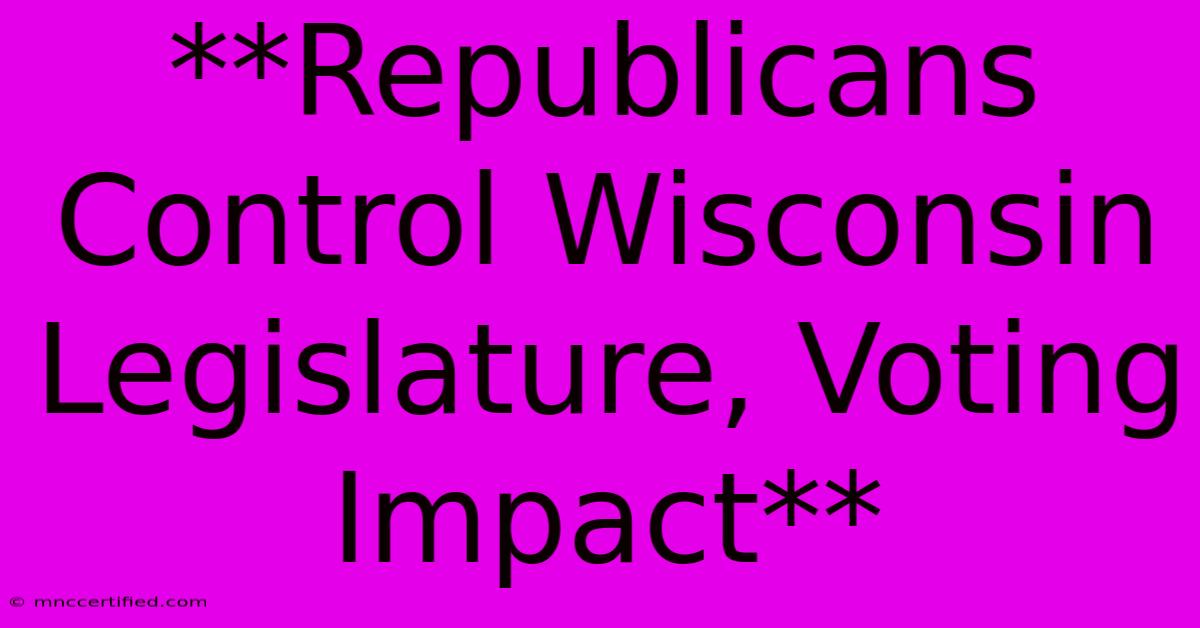**Republicans Control Wisconsin Legislature, Voting Impact**

Table of Contents
Republicans Control Wisconsin Legislature: How Does This Impact Voting?
The Republican Party holds a strong majority in both the Wisconsin State Assembly and Senate. This political landscape has significant implications for voting in the state, impacting everything from election administration to voter access. Understanding the dynamics of this political control is crucial for understanding the voting experience in Wisconsin.
How the Republican Majority Shapes Wisconsin's Voting Landscape
1. Election Administration: Republicans have a direct influence on how elections are conducted. This includes:
- Appointing Election Officials: Republican-controlled state government appoints officials who oversee elections, potentially shaping the election process and its integrity.
- Legislation: Republicans can introduce and pass legislation that impacts voting procedures, such as voter ID laws, absentee voting rules, and early voting restrictions.
2. Voter ID Laws: Wisconsin has a strict voter ID law, requiring voters to present a photo ID at the polls. This law, supported by Republicans, has been criticized by voting rights advocates for disproportionately disenfranchising minority voters and students.
3. Absentee Voting: Republicans have made changes to absentee voting rules, limiting the time frame for requesting and returning absentee ballots. This could impact voter access, particularly for those who find it difficult to vote in person.
4. Redistricting: After each census, state legislatures are responsible for redrawing district boundaries. This process can be used to manipulate districts, potentially favoring one party or another. In Wisconsin, Republicans have been criticized for gerrymandering, making it harder for Democrats to win seats in the legislature.
The Impact on Voting Access and Participation
The Republican majority's influence on voting laws and administration has a tangible impact on voters:
- Voter Suppression: Critics argue that some Republican-backed policies, such as voter ID laws and changes to absentee voting, are designed to suppress voter turnout, particularly among minority voters and other groups that tend to vote Democratic.
- Voter Convenience: Limited early voting options and stricter absentee voting regulations could make it more challenging for voters, especially those who are busy or have limited mobility, to participate in elections.
- Representation: The impact of redistricting on election outcomes can influence the overall political representation of different groups within the state.
Moving Forward: Ensuring Fair and Accessible Voting
The impact of Republican control on voting in Wisconsin remains a topic of debate and concern. While the party argues its policies are aimed at ensuring election integrity, critics argue that these measures disproportionately impact marginalized communities and hinder voter access.
To ensure fair and accessible voting in Wisconsin, it is crucial to:
- Advocate for Voter Rights: Supporting organizations that defend voting rights and advocate for policies that promote voter access is crucial.
- Participate in the Political Process: Voters can make their voices heard by actively participating in elections, contacting their elected officials, and supporting candidates who prioritize fair and accessible voting.
- Monitor Election Administration: Closely monitoring the administration of elections and raising concerns about any potential violations of voting rights is essential.
The future of voting in Wisconsin will depend on the ongoing dialogue and efforts to ensure a fair and equitable electoral system. It is crucial for all voters to stay informed, engage in the process, and advocate for policies that protect and promote the right to vote.

Thank you for visiting our website wich cover about **Republicans Control Wisconsin Legislature, Voting Impact**. We hope the information provided has been useful to you. Feel free to contact us if you have any questions or need further assistance. See you next time and dont miss to bookmark.
Featured Posts
-
Does Cyber Insurance Cover Ransom Payments
Nov 07, 2024
-
Arsenal Legend Predicts Saliba Vs Martinez Clash
Nov 07, 2024
-
Champions League Red Star Belgrade Vs Opponent Livestream
Nov 07, 2024
-
Tesla Stock Jumps 14 On Trump Victory
Nov 07, 2024
-
Uncertain Future Ukraine Seeks Trumps Help
Nov 07, 2024